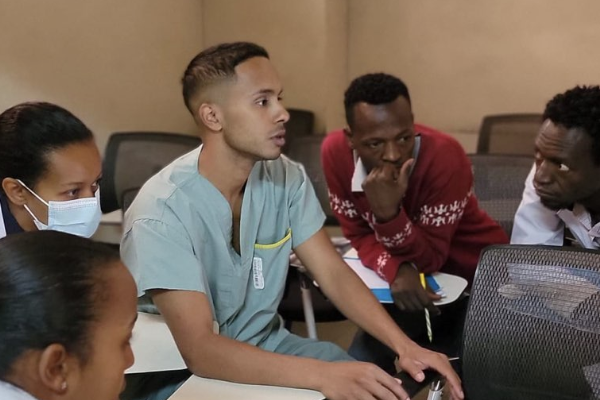"Whoever enters the way without a guide will take a hundred years to travel a two-day journey." – Rumi
The Department of Family and Community Medicine (DFCM) values the contributions of our faculty and is committed to supporting them in addressing their mentorship interests. Mentorship is key in helping faculty fulfill their professional goals, improve their job satisfaction, and build a supportive culture across our department. DFCM is made up of over 100 faculty mentors with various interests in research, teaching, and career development.
Guiding principles of mentorship:
Responsive – Goal-oriented – Confidential
- Mentorship is a dynamic, reciprocal relationship leading to positive change both for the career development of the involved individuals and for the cultural development of the department.
- Important and necessary factors in successful mentoring relationships are a shared value system and mutual respect.
- DFCM Mentorship is designed to complement the important informal mentoring that is already happening. Participation in this process is entirely voluntary. Mentoring within DFCM is designed to be mutually generative, and either person has the option of withdrawing at any time.
Find a Mentor
Finding a Mentor
Please complete the mentee profile form and the DFCM Mentorship Team will reach out to you with next steps regarding available mentoring opportunities tailored to your goals. Review the list of mentors' qualifications and backgrounds to help identify who would be a good fit for you, and pick 3 to identify who will be a good fit for you.
Review the sample checklist and contract for suggestions to guide you through initiating your mentoring journey.
Being a Mentor
Please complete the mentor profile form and the DFCM Mentorship Team will reach out to you with next steps. Be sure to read through DFCM’s mentoring resources to help guide you as a mentor.
Mentorship Models
One-to-one: Traditional method where a more junior individual is matched with a more senior individual.
Group: A flexible version of the traditional model where one to two mentors are paired with a small group of mentees. In this scenario, mentees can also become mentors to one another.
Peer: This model of mentorship can be conducted in a traditional one-on-one or group setting. Those involved will be at the same career stage.
Flash: One-time meetings that allow individuals to connect with another DFCM faculty member. A great way to ask a particular question or meet someone new. These are generally shorter meetings so there is little investment required. If the meeting is beneficial, the pair can organize follow-up meetings on their own.
Reverse: The opposite of the traditional one-on-one mentorship model, where a more senior individual looks to gain insights from a more junior individual. This provides the more experienced member with a new perspective and allows junior members to gain valuable leadership skills.
Four Phases of Mentorship
1. Initiation: This is the preparation stage where you determine your readiness to engage in a mentoring relationship and start the matching process. Consider what you are hoping to gain from this experience and the mentorship model that best aligns with these goals. Get to know your mentee/mentor and begin to build a rapport together.
2. Negotiation: Take time to determine your goals for the mentoring relationship. Set clear boundaries and expectations.
3. Enabling: This is when the work begins. Come to your session(s) prepared and be respectful of established boundaries and or agreements. Mentors will provide constructive feedback and the mentee will apply this to help work toward their goals.
4. Coming to closure: This is the time to reflect on your mentorship experiences and celebrate your accomplishments. Determine areas of growth and next steps after the partnership/activity closes.
Dr. Viola Antao is the DFCM Mentorship Lead. Alyshia D'Cunha is the Awards, Mentorship & Wellness Administrator. Email: dfcm.mentorship@utoronto.ca
Faculty Development Leads can facilitate site-specific mentorship. Find your faculty development lead here.




